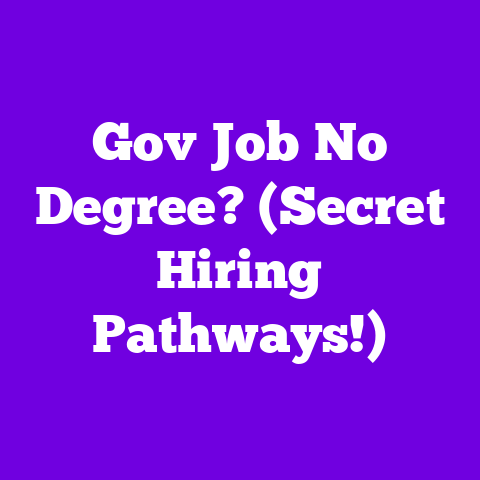Bachelor’s in One Year? (Fast Track!)
Well, buckle up, because we’re diving deep into the world of accelerated degree programs.
I’m here to help you understand if a fast-track bachelor’s degree is the right choice for you, especially as we look towards 2025.
Introduction: The Transformation of Higher Education
Higher education isn’t what it used to be. Remember those days when a four-year college degree was the only path to success?
Times have changed. The workforce is evolving at warp speed, and so are the demands on learners like you.
Think about it: technology is advancing, the economy is shifting, and your expectations are different.
You want flexibility, relevance, and speed. That’s why more and more institutions are offering accelerated degree programs.
These programs are designed to get you job-ready faster. So, what’s driving this shift?
Well, technology is a major factor, enabling online learning and more efficient teaching methods.
Economic pressures also play a role, as students seek to minimize tuition costs and enter the workforce sooner.
Plus, let’s be real, you want to get on with your life!
So, let’s explore the concept of a one-year bachelor’s degree and see if it’s the right fit for your goals.
Section 1: The Rise of Accelerated Degree Programs
What exactly are accelerated degree programs? Simply put, they are compressed versions of traditional degree programs.
They allow you to earn a bachelor’s degree in less time than the standard four years.
These programs appeal to students who are highly motivated, have prior college credits, or want to quickly advance their careers.
Historically, accelerated programs emerged as a response to the growing need for skilled workers and the desire for more efficient education.
During World War II, many colleges offered accelerated programs to help students graduate quickly and join the war effort.
This concept has evolved over time, with modern programs leveraging technology and innovative teaching methods.
Now, let’s talk numbers. According to a study by the National Center for Education Statistics (NCES), the number of students enrolled in accelerated programs has been steadily increasing over the past decade.
While specific data on one-year bachelor’s programs is limited, the overall trend indicates a growing interest in faster degree pathways.
Fields like business, technology, and healthcare are particularly popular for accelerated degrees.
For example, Northeastern University offers an accelerated MBA program that can be completed in as little as one year.
These programs often require a significant time commitment and a rigorous course load.
They are designed for students who are ready to immerse themselves fully in their studies.
Section 2: Understanding the Fast-Track Bachelor’s Degree
Okay, so how does a fast-track bachelor’s degree actually work? Let’s break it down.
The structure is usually intense, with a heavy course load packed into a shorter timeframe.
You might be taking multiple courses simultaneously, with shorter semesters or trimesters.
Teaching methods often include a mix of lectures, seminars, online modules, and project-based learning.
Assessment styles can vary, but you can expect frequent exams, papers, presentations, and group projects.
The typical duration of these programs is one to two years, but some institutions offer even faster options.
For instance, some colleges allow you to earn credit for prior learning or work experience, further shortening the timeframe.
Online learning plays a crucial role in facilitating accelerated education.
It provides flexibility and allows you to study at your own pace, albeit within a structured framework.
Hybrid models, which combine online and in-person instruction, are also common.
These models offer the best of both worlds: the convenience of online learning and the engagement of face-to-face interaction.
Intensive courses, such as weekend seminars or week-long boot camps, are another way to condense coursework.
These courses require a significant time commitment but allow you to quickly master specific skills or topics.
Section 3: The Benefits of Earning a Bachelor’s Degree in One Year
So, why would anyone want to cram four years of learning into just one? The benefits are numerous.
First and foremost, you’ll save time and money. Completing your degree faster means less tuition, fewer living expenses, and quicker entry into the workforce.
Think about it: you could be earning a salary while your peers are still in school.
A fast-track degree can also enhance your career prospects. It demonstrates your ability to learn quickly, manage your time effectively, and handle pressure.
Employers often value these skills, as they are essential for success in today’s fast-paced business environment.
You’ll also gain a competitive edge in the job market. A one-year bachelor’s degree can set you apart from other candidates who have followed the traditional four-year path.
Plus, achieving such a significant milestone in a short period can be incredibly empowering.
It can boost your confidence, increase your motivation, and inspire you to pursue even bigger goals.
I’ve seen students who were initially hesitant about the intensity of the program thrive in the accelerated environment.
They discover a newfound sense of discipline and determination that carries over into other areas of their lives.
Section 4: Challenges and Considerations in the Fast-Track Approach
Now, let’s be real: a fast-track bachelor’s degree isn’t all sunshine and rainbows. There are challenges to consider.
The intensity of the coursework can be overwhelming. You’ll need to be prepared to dedicate a significant amount of time and energy to your studies.
Strong time management skills are essential. You’ll need to be able to prioritize tasks, manage deadlines, and avoid procrastination.
Mental and emotional resilience are also crucial. The accelerated pace can be stressful, and you’ll need to be able to cope with pressure and setbacks.
Burnout is a potential pitfall. It’s important to take breaks, practice self-care, and seek support when needed.
The quality of education is another consideration. Some critics argue that accelerated programs sacrifice depth for speed.
However, many institutions have developed rigorous curricula and experienced faculty to ensure that students receive a high-quality education.
To navigate these challenges, it’s important to choose a reputable program, develop a strong support system, and maintain a healthy work-life balance.
I’ve worked with students who have successfully managed these challenges by setting realistic goals, seeking help from tutors and mentors, and prioritizing their physical and mental well-being.
Section 5: Profiles of Successful Fast-Track Graduates
Let’s meet some people who have actually done it.
I know a former student, Sarah, who completed her bachelor’s degree in business administration in just one year.
She had previously earned an associate’s degree and wanted to quickly advance her career.
Sarah found the program challenging but rewarding. She said that it taught her how to prioritize tasks, manage her time effectively, and work under pressure.
After graduating, Sarah landed a job as a marketing manager at a tech startup.
She credits her accelerated degree with giving her the skills and confidence to succeed in her new role.
Another student, David, completed his bachelor’s degree in computer science in 18 months.
He had been working in the IT industry for several years but wanted to formalize his education.
David found that the accelerated program allowed him to build upon his existing knowledge and skills while earning a degree quickly.
He now works as a software engineer at a major tech company.
These are just a few examples of the many individuals who have successfully completed a fast-track bachelor’s degree.
Their stories illustrate the transformative journey that these programs can offer.
They also demonstrate the importance of motivation, dedication, and resilience in achieving success in an accelerated environment.
Section 6: The Future of Fast-Track Bachelor’s Degrees
What does the future hold for accelerated degree programs? As we look towards 2025 and beyond, several trends are emerging.
The integration of artificial intelligence (AI) is likely to play a significant role.
AI-powered learning platforms can personalize the learning experience, provide customized feedback, and adapt to your individual needs.
Personalized learning is another key trend. Accelerated programs are increasingly tailoring their curricula and teaching methods to meet the specific needs of individual learners.
Competency-based education (CBE) is also gaining traction. CBE programs focus on assessing your skills and knowledge rather than the amount of time you spend in a classroom.
This allows you to earn credit for what you already know, further accelerating your path to graduation.
Societal changes, such as the rise of the gig economy and remote work, are also influencing the demand for fast-track degrees.
As more people work independently or remotely, they need to acquire new skills and credentials quickly.
Accelerated programs provide a convenient and efficient way to meet these needs.
I believe that the future of education is about flexibility, personalization, and relevance.
Fast-track bachelor’s degrees are well-positioned to meet these demands and provide you with a pathway to success in the 21st-century workforce.
Conclusion: Embracing the Transformation in Education
So, what does all of this mean for you?
Fast-track bachelor’s degrees represent a significant shift in higher education.
They offer a powerful tool for personal and professional transformation.
Whether you’re looking to advance your career, change fields, or simply achieve a personal goal, an accelerated program may be the right choice for you.
It’s important to consider your own educational journey and the possibilities that lie ahead.
Adaptability and continuous learning are essential in today’s world.
By embracing the transformation in education, you can unlock your full potential and create a brighter future for yourself.
I encourage you to explore your options, research different programs, and talk to current students and alumni.
With the right planning and preparation, you can achieve your educational goals and embark on a fulfilling and successful career.
Remember, the future of education is in your hands.






